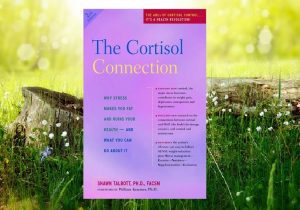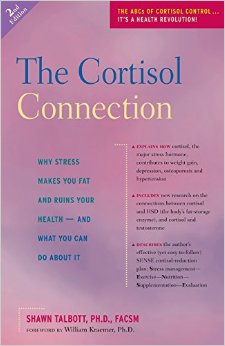I established 9to5strength to help the 9am-5pm (or 8am-8pm!) office worker take control of their life for the better.
A big factor that needs addressing is stress and understanding the physical and mental effect cortisol (the stress hormone) has on your health. This will go a long way to shaping how you approach each day, week and month from now on.
My first recommended read is …
The Cortisol Connection by Shawn M Talbot
PRO TIP: Take notes! When you read a book, use a blank sheet of paper as a bookmark. Write down any interesting facts and information from the book. This condenses a whole book into 3-4 pages of key notes that are important and relevant to you.
My Notes
Stress increases cortisol, which reduces testosterone, lowering sex drive and increasing fatigue and body fat.
- Fat contains an enzyme, HSD, that increases cortisol within the cell to encourage more fat storage.
- HSD increases with age, explaining “middle age spread”.
- HSD activity increases 3.4x within fat cells when a person follows a stressful diet (extreme 800kcal), leading to fat gain to pre-diet levels.
- Testosterone decreases if a weight loss diet is not coupled with exercise.
- Decrease in testosterone with age means muscle loss and 0.5% fewer calories burned at rest per year from age 20 onward. If you burned 2000kcal at 20, that becomes 1700kcal at 50.
- Inadequate sleep doesn’t allow cortisol to fully dissipate.
- To reduce cortisol, cut down on alcohol and caffeine.
- The caffeine in a cup of coffee increases cortisol by 30% within an hour.
Elevated cortisol levels increase the rate at which your body breaks down muscle.
- Improve cortisol management by establishing a regular bed-time and wake up time.
- A sleep cycle is 90 minutes so try to plan a set number of cycles (6hrs, 7.5hrs, 9hrs).
- Avoid intense exercise within three hours of bed time due to increased alertness.
- Blue light from mobiles & laptops disrupts sleep quality. (download f.lux for laptop – http://justgetflux.com)
- 450% increased risk of obesity from skipping breakfast as metabolic rate lowers without food and you burn 100-200 less calories throughout the day.
- Research states 20% protein, 50% carbohydrate and 30% fat is the best ratio for weight loss and weight maintenance.
- For a 1600kcal diet that equates to 80g Protein, 200g Carb and 53g Fat.
- For a 2000kcal diet that equates to 100g Protein, 250g Carb and 67g Fat.


